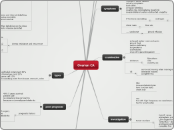Ovarian CA
silent killer
10% associated with endometrial CA
hx
family
breast
ovary
colorectal
syndromes associated
breast ovarian cancer syndrome-BRCA
lynch syndrome - hereditary non polyposis colorectal cancer
endometrial cancer
ovarian cancer
first degree one relative 20%
first degree two relatives 50%
gyn
look at risk factors given below
specially + things
social
fertility wish
education
symptoms
epigastric symptoms
like gastritis
pelvic symptoms like pain
preasure symptoms
persistent pelvic and abdominal pain
increased abdominal size/ persistent bloating
difficulty eating and feeling full quickly
change in bowel habbits
urinary symptoms
back ache
irregular bleeding
invation like lymphedema lowerlimb
invade bilateral ureters obstructed uropathy
if hormone secreating
androgen
androgenic features
distal mets
liver etc
.... syndrome
pleural effusion
examination
enlarged nodes- neck and groin
pleural fluid
nutrion deficiency
lympoedema
ckd features
sings of hyperandrogenism
abdomen
like others
size
mobility etc
VE
cervix not moving when moving mass
adenexial masses
complete this
investigation
FBC
Urea and electrolytes
liver function tests
chest xray
uss
tvs with high frequency cos resolutuon good
tas for lymphnodes
solid and cyst
compartments
thick walled
thick septae
bylateral
assess endometrium too
tumor markers
Ca125 -serus
alphapheto protein- germcell tumor
LDH disgerminoma
beta HCG - chorio CA of overy
androgens androblastima
complete this
if less than 40 years
do first 4
if more than 40 don't
ca 125
non specific
from peritonium
CT
MRI
staging purpous
but staging done at surgery
colonoscopy / barium enema
if bowel symptoms
colonic cancer suspicions
laparoscopy and biopsy
if unknown diagnosis
for neoadjuvent chemo
management
multydisciplinary team
gynaecological oncologist
radiologist
pathologist
preserve ovams in
stage 1c below
surgery
staging laparotomy
midline laparatomy
free fluid for cytology
if not take peritoneal wash
look for mets-
pelvic pre aortic para aortic lymphnodes
complete this
TAH
BSO
infracolic omentectomy
lymphnode sampling
maximum cytoredution (almost all vissible)
bowel
spleen liver etc
stages
FIGO classification
read ten teachers gyn
stage 1
stage 2
stage 3
stage 4
postop
chemotherapy
need in staging
best is intaperitoneal chemo
Platinum compound
most effective agents
carboplatin
dose calculated according to
GFR using AUC
paclitaxol
pre emptive steroids are given to reduce hypersensitive reactions
peripheral neuropathy
neutropenia
loss of total body hair
neoadjuvent chemo and interval debulking
this improves postop morbidity
but doesn't improve survival
further debulking can be done
if bulky disease persisted
chemo resistance and recurrence
with in 6months
platynum resistense
6_12
intermitten
>12
can treat with same drugs
types
epithelial commonest 80%
stromal-sex cord 10%
germ cell 10%
krukenberg-mets from breast, stomach, colon
poor prognosis
40% 5 years survival
present late
no screening like cervical CA
because no premalignant state etc
prognostic factors
stage
grade
extent of surgery
histo type
chemo sensitivity
age
fitness
prevention
screening
women age 35 or above
symptoms
sings
tumor markers ca125
uss
every 6 moths
after complete family prophylactic bso
risk factors
+
nuliparity
IU device
endometriosis
cigarette smoking-mucinous only
obesity
-
multiparity
cocp
tubal ligation
hysterectomy
